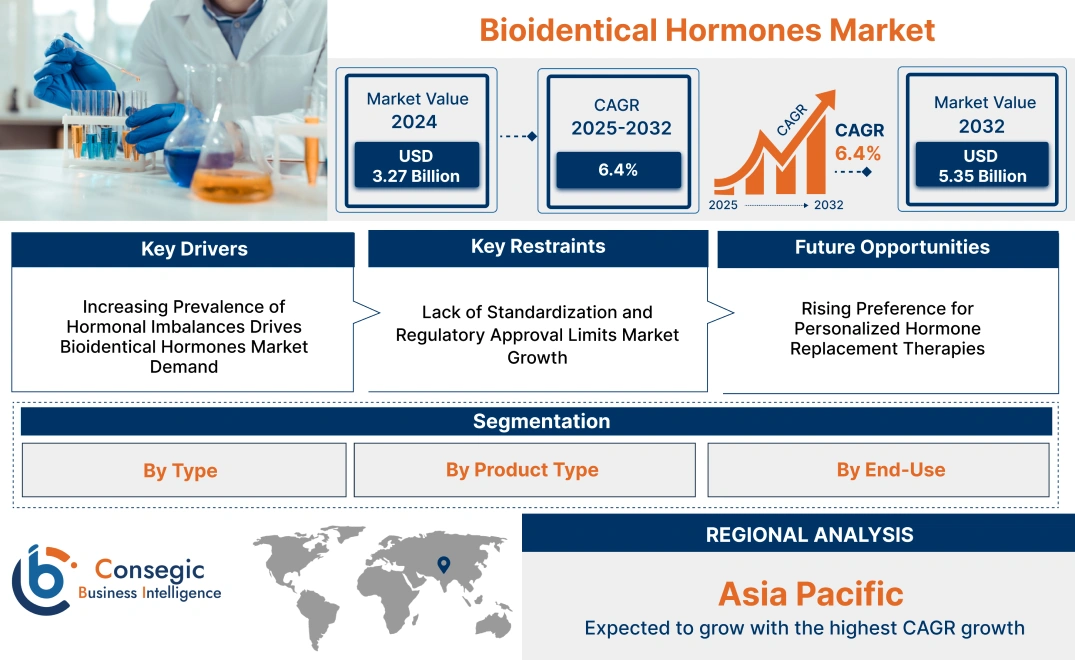- Summary
- Table Of Content
- Methodology
Bioidentical Hormones Market Size:
Bioidentical Hormones Market size is estimated to reach over USD 5.35 Billion by 2032 from a value of USD 3.27 Billion in 2024 and is projected to grow by USD 3.42 Billion in 2025, growing at a CAGR of 6.4 % from 2025 to 2032.
Bioidentical Hormones Market Scope & Overview:
The bioidentical hormones market involves the development and application of hormones that are chemically identical to those naturally produced by the human body. These hormones, including estrogen, progesterone, and testosterone, are primarily used in hormone replacement therapy (HRT) to treat hormonal imbalances. Bioidentical hormones are derived from plant sources like soy and yams, offering a natural alternative to synthetic hormones. Key characteristics include structural similarity to endogenous hormones, improved absorption, and minimal side effects. The benefits of bioidentical hormones include personalized treatment options, reduced risk of adverse reactions, and enhanced effectiveness in managing symptoms of menopause, andropause, and thyroid disorders. The primary applications include managing menopausal symptoms, treating low testosterone levels, and addressing hormonal disorders in hospitals, clinics, and specialty hormone therapy centers.
Bioidentical Hormones Market Dynamics - (DRO) :
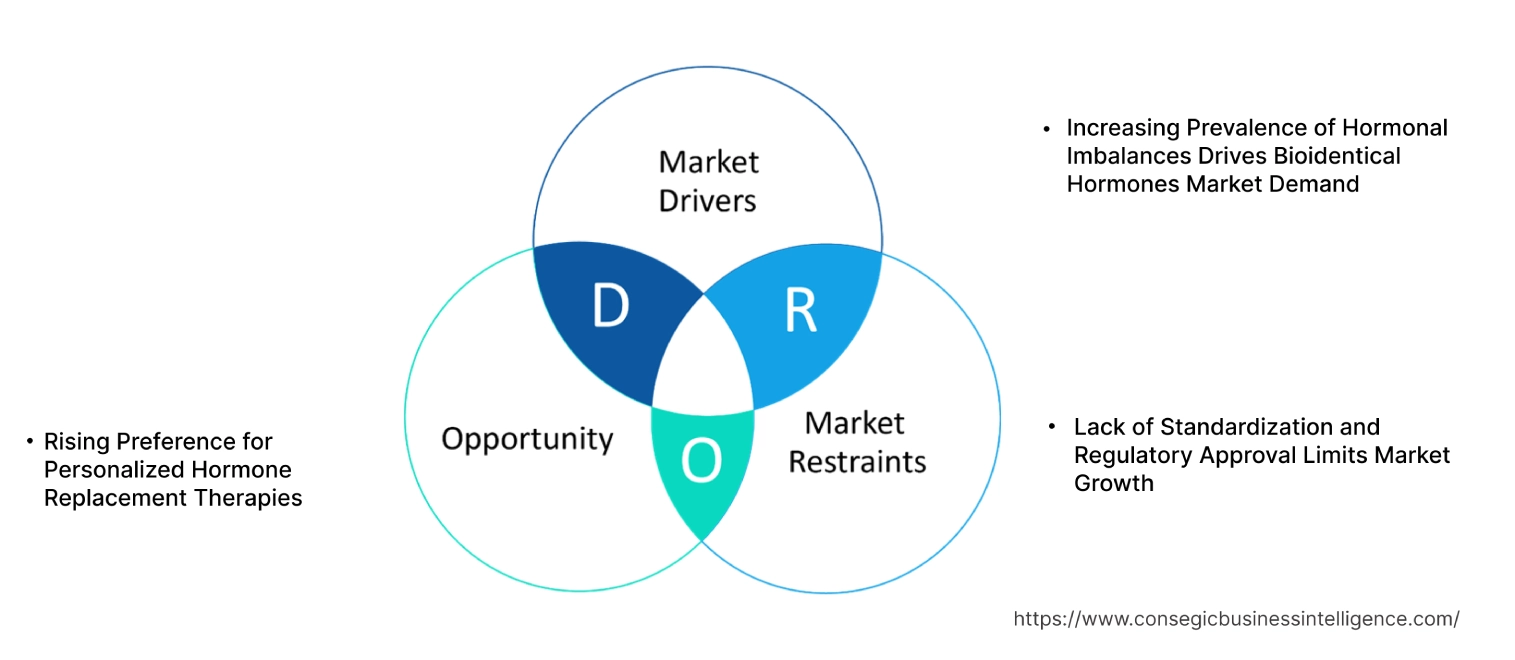
Key Drivers:
Increasing Prevalence of Hormonal Imbalances Drives Bioidentical Hormones Market Demand
The rising incidence of hormonal imbalances, particularly among aging populations, is a significant driver for the growth of the bioidentical hormones market. Hormonal disorders such as menopause, andropause, thyroid dysfunction, and adrenal fatigue are becoming more prevalent due to factors like changing lifestyle habits, stress, and longer life expectancy. Bioidentical hormones, which are chemically identical to those naturally produced by the human body, offer a tailored approach to hormone replacement therapy (HRT), addressing symptoms like hot flashes, mood swings, and fatigue.
Patients and healthcare providers are increasingly opting for bioidentical hormones over traditional synthetic hormones due to their perceived safety, natural composition, and ability to deliver personalized treatment plans. This shift is supported by growing awareness and demand for customized therapies, further accelerating bioidentical hormones market growth.
Key Restraints :
Lack of Standardization and Regulatory Approval Limits Market Growth
The bioidentical hormones market faces significant restraints due to the lack of standardization and limited regulatory oversight. Many bioidentical hormone products are compounded by pharmacies without formal approval from regulatory bodies like the U.S. Food and Drug Administration (FDA). This absence of standardized manufacturing processes raises concerns about product quality, consistency, and safety, affecting consumer trust. Additionally, discrepancies in hormone dosage and the lack of large-scale clinical trials to prove efficacy and safety hinder widespread adoption by healthcare professionals. Misconceptions about the safety of bioidentical hormones, fueled by mixed opinions within the medical community, further challenge market trends, limiting the potential patient base.
Future Opportunities :
Rising Preference for Personalized Hormone Replacement Therapies
The growing consumer demand for personalized healthcare solutions presents a significant opportunity for the bioidentical hormones market. As patients seek tailored treatment plans to address specific hormonal imbalances, bioidentical hormone replacement therapy (BHRT) offers a more customized approach compared to conventional synthetic hormones. Increasing awareness about the benefits of BHRT, such as improved symptom relief and fewer side effects, is driving adoption. Moreover, advancements in hormone testing and diagnostics are enabling healthcare providers to create individualized therapies based on precise hormone level assessments. This trend is expected to boost market growth as more patients opt for personalized and safer alternatives for hormone replacement therapy.
Bioidentical Hormones Market Segmental Analysis :
By Type:
Based on types, the market is segmented into estrogen, Progesterone, Testosterone, and Combined Hormones.
Estrogens accounted for the largest revenue of 41.75% in the bioidentical hormones market share in 2024.
- Estrogens are one of the most commonly prescribed bioidentical hormones, primarily used to manage symptoms associated with menopause, such as hot flashes, night sweats, and vaginal dryness.
- These hormones are synthesized to mimic the natural estrogen produced by the ovaries, offering a more tailored approach to hormone replacement therapy (HRT).
- The demand for bioidentical estrogens has been increasing due to their perceived safety and efficacy in reducing menopausal symptoms.
- Patients often prefer bioidentical estrogens over synthetic alternatives because they are structurally identical to human hormones, potentially reducing the risk of side effects.
- Therefore, as per the market trends analysis, the adoption of HRT, and innovative initiatives for potentially reducing the risks and side effects, creating Bioidentical hormones opportunities.
Progesterone is expected to have the fastest CAGR during the forecasted period.
-
- Bioidentical progesterone is widely used to treat a range of conditions, including menstrual irregularities, premenstrual syndrome (PMS), and hormone deficiencies.
- It is essential in hormone replacement therapies, particularly for women undergoing menopause or those who have undergone a hysterectomy.
- Progesterone helps balance estrogen levels, reducing the risk of endometrial hyperplasia, which can lead to cancer.
- It is also used to support pregnancy and alleviate symptoms of perimenopause, such as mood swings and sleep disturbances.
- The preference for bioidentical progesterone has grown due to its effectiveness in closely mimicking the body's natural hormone.
- Thus, as innovation continues and the market expands, progesterone, and balance in menstrual irregularities are enhancing health outcomes, boosting the bioidentical hormones market trends.
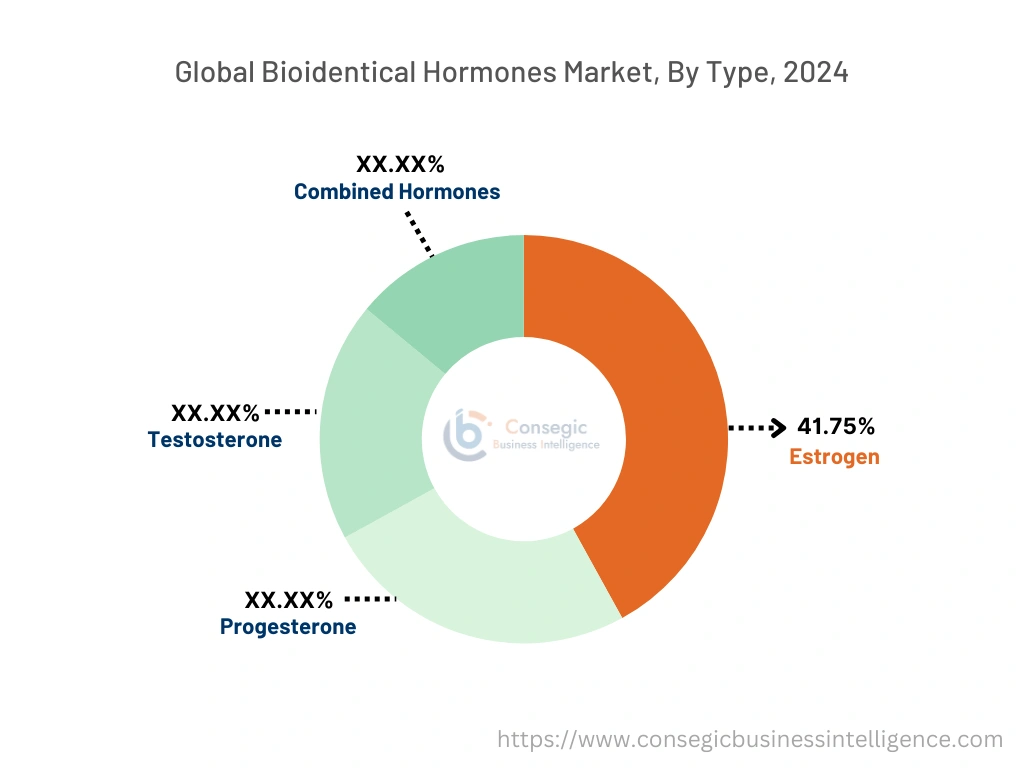
By Product Type:
Based on product type the market is segmented into Tablets and Capsules, Creams and Gels, Injectable, Patches, and Implants.
Tablets and Capsules accounted for the largest revenue in the Bioidentical hormones market share in 2024.
- Oral forms, including tablets and capsules, are popular delivery methods for bioidentical hormones due to their convenience and ease of use.
- These products allow precise dosing and are often preferred for their straightforward administration.
- Tablets and capsules are typically used for bioidentical estrogen, progesterone, and testosterone therapies, helping patients manage hormonal imbalances effectively.
- However, the first-pass metabolism in the liver can affect the bioavailability of these hormones, which has led to the development of alternative delivery forms.
- Despite this, oral bioidentical hormone products remain a preferred choice for many patients seeking non-invasive treatment options, which further indicates the expansion in the market share.
- Thus, the analysis shows that popular delivery methods, therapies, and other products are boosting the bioidentical hormones market trends.
Creams and Gels are expected to have the fastest CAGR during the forecasted period.
- Topical applications like creams and gels are widely favored for their ability to deliver bioidentical hormones through the skin, bypassing the liver and enhancing bioavailability.
- These products offer a consistent release of hormones, making them effective for managing symptoms of hormonal imbalances.
- Estrogen and progesterone are commonly administered through creams and gels, allowing users to adjust the dosage easily. They are particularly beneficial for patients who have difficulty swallowing pills or prefer a non-oral method of hormone delivery.
- The market for creams and gels is expanding due to their effectiveness in providing steady hormone levels and reducing side effects.
- Thus, according to the bioidentical hormones market analysis services provided, applications for enhancing bioavailability are boosting the market trend.
By End-Use:
Based on end-user the market is segmented into Hospitals, Gynecology Clinics, Academic and Research Institutes, and Others.
Hospitals accounted for the largest revenue share in 2024.
- Hospitals are key end-users in the bioidentical hormones market, providing hormone replacement therapies under strict medical supervision.
- In hospital settings, treatments are carefully monitored by healthcare professionals, ensuring accurate dosing and minimizing potential side effects.
- Hospitals often manage complex cases of hormonal imbalances, such as severe menopause symptoms, and offer personalized treatment plans using bioidentical hormones.
- The increasing awareness of hormone-related health issues and the rising prevalence of conditions like hypogonadism and menopause have driven the adoption of bioidentical hormones in hospital-based therapies, making this segment a significant contributor to the market.
- Thus, according to the analysis depicts growing number of strict medication supervision, monitored treatment and increasing awareness is boosting the market trends.
Gynecology Clinics are expected to have the fastest CAGR during the forecasted period.
- Gynecology clinics play a critical role in administering bioidentical hormone therapies, focusing on women's health issues, including menopause, PMS, and hormonal imbalances.
- These clinics specialize in personalized hormone replacement therapy, often tailoring treatment to each patient's unique hormonal profile.
- Gynecologists prefer using bioidentical hormones due to their structural similarity to natural hormones, which can lead to better patient outcomes and fewer adverse effects.
- The demand for bioidentical hormone therapy (BHRT) in gynecology clinics is increasing as more patients seek natural and customized treatment options for managing menopausal symptoms and other hormonal disorders.
- In recent times, according to the analysis the trend depicts the treatment clinics, tailored treatment profiles, and BHRT is resulting in market expansion.
Regional Analysis:
The regions covered are North America, Europe, Asia Pacific, the Middle East and Africa, and Latin America.
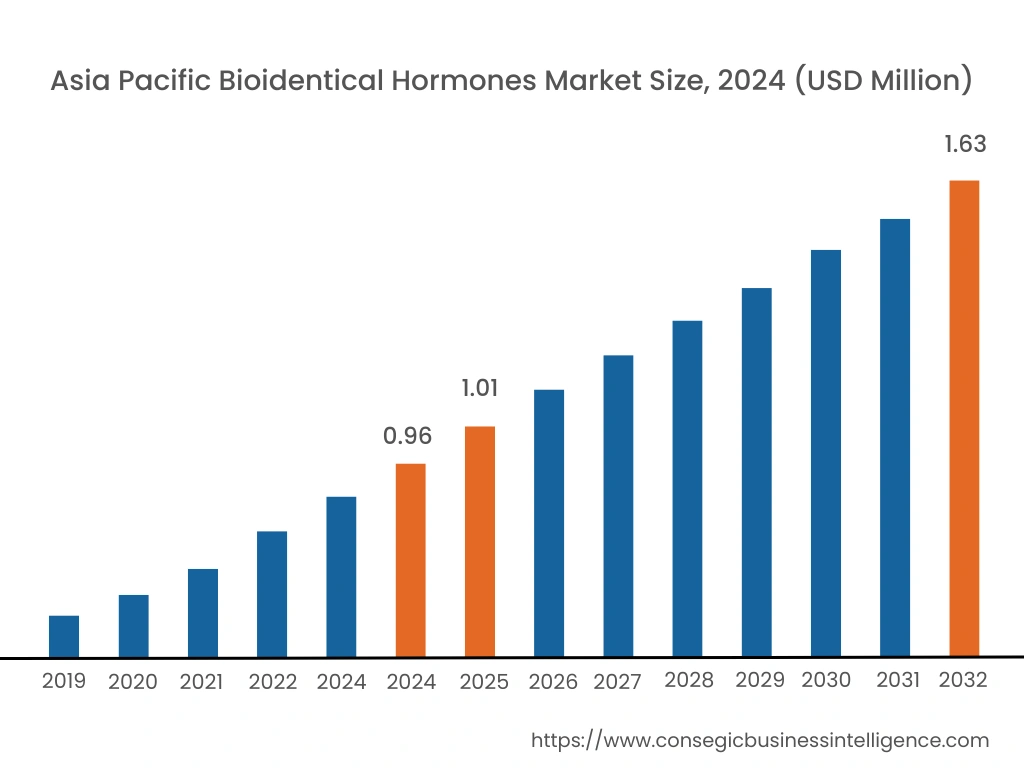
Asia Pacific region was valued at USD 0.96 Billion in 2024. Moreover, it is projected to grow by USD 1.01 Billion in 2025 and reach over USD 1.63 Billion by 2032. Out of these, China accounted for the largest share of 31.7% in 2024. The Asia-Pacific region is witnessing rapid growth in the bioidentical hormones market, fueled by a rising prevalence of hormonal disorders and increasing healthcare investments. Countries such as China and India are experiencing heightened demand for BHRT, driven by a large patient base and improving healthcare access as per the analysis. Cultural acceptance of alternative medicine and advancements in medical technology further support the bioidentical hormones market expansion in this region.
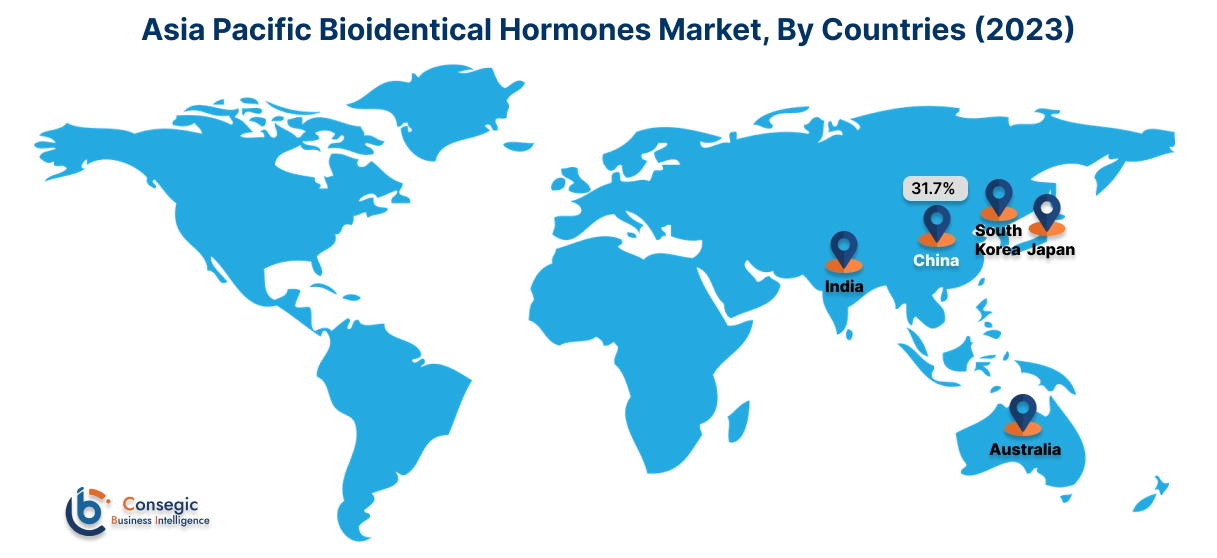
North America is estimated to reach over 1.73 Billion by 2032 from a value of USD 1.08 Billion in 2024 and is projected to grow by USD 1.13 Billion in 2025. North America leads the global bioidentical hormones market, driven by a high prevalence of hormone-related health conditions and a strong preference for personalized medicine. The United States, in particular, exhibits a significant demand for bioidentical hormone replacement therapies (BHRT), supported by advanced healthcare infrastructure and a growing aging population. The region's focus on research and development, along with increasing awareness among patients and healthcare providers, further propels market growth.
In Europe, the bioidentical hormones market is expanding due to rising incidences of hormonal imbalances and a shift towards natural treatment options. Countries like Germany and the United Kingdom are at the forefront, with healthcare systems increasingly integrating BHRT into treatment protocols. Regulatory support and a growing emphasis on patient-centric care contribute to the market's positive trajectory in this region.
In the Middle East and Africa, the bioidentical hormones market is emerging, influenced by growing healthcare awareness and investments in medical technologies. Countries like the UAE and Saudi Arabia are leading the way, with initiatives aimed at enhancing healthcare services and promoting wellness. However, the market faces challenges due to regulatory constraints and limited access to advanced bioidentical hormone products.
Latin America is witnessing gradual growth in the bioidentical hormones market, driven by increasing healthcare needs and a focus on preventive care. Brazil and Mexico are the primary contributors, with rising awareness of bioidentical hormone benefits and a growing interest in personalized health solutions. The market is supported by collaborations between local startups and international companies aiming to introduce innovative bioidentical hormone products to the region.
Top Key Players & Market Share Insights:
The Bioidentical Hormones market is highly competitive with major players providing products and services to the national and international markets. Key players are adopting several strategies in research and development (R&D), product innovation, and end-user launches to hold a strong position in the global Bioidentical Hormones market. Key players in the Bioidentical Hormones industry include -
- SottoPelle (United States)
- BioTE Medical (United States)
- Advantage Pharmaceuticals (United States)
- Full Life Wellness Center (United States)
- Neuva Aesthetics (United States)
- Novartis AG (Switzerland)
- Orion Pharma AB (Finland)
- Bayer AG (Germany)
- Merck KGaA (Germany)
- Pfizer Inc. (United States)
Bioidentical Hormones Market Report Insights :
| Report Attributes | Report Details |
| Study Timeline | 2019-2032 |
| Market Size in 2032 | USD 5.35 Billion |
| CAGR (2025-2032) | 6.4% |
| By Type |
|
| By Product Type |
|
| By End-use |
|
| By Region |
|
| Key Players |
|
| North America | U.S. Canada Mexico |
| Europe | U.K. Germany France Spain Italy Russia Benelux Rest of Europe |
| APAC | China South Korea Japan India Australia ASEAN Rest of Asia-Pacific |
| Middle East and Africa | GCC Turkey South Africa Rest of MEA |
| LATAM | Brazil Argentina Chile Rest of LATAM |
| Report Coverage |
|
Key Questions Answered in the Report
What is driving the bioidentical hormones market growth? +
Rising demand for hormone replacement therapies and growing awareness of personalized medicine.
What are the major types of bioidentical hormones available? +
Common types include estrogen, progesterone, and testosterone.
Who typically uses bioidentical hormones? +
They are mainly used by individuals undergoing menopause or dealing with hormone imbalances.
How large is the bioidentical hormones market? +
The market is expanding rapidly, estimated to reach over 5.35 billion USD by 2032.
